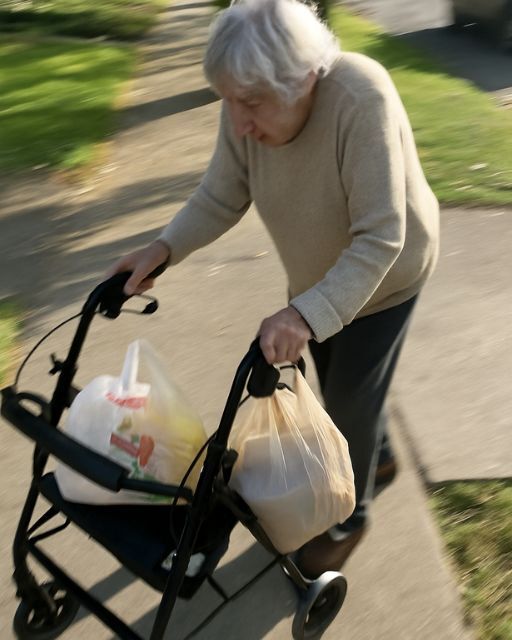It was just before 5 p.m. when I saw her slowly making her way down the sidewalk.
The wheels of her walker squeaked with every step,
and two grocery bags hung from the handles—
one with a loaf of bread and a few cans,
the other cradling warm takeout containers, wrapped carefully in a towel.
She didn’t notice me watching from across the street.
Her focus was unwavering—
like this short stretch of pavement was a mission she absolutely intended to complete.
I’d seen her before—Miss Inez.
She lived three doors down, always kept her curtains open,
and waved at the mailman like it was part of her daily ritual.
But today, something felt different.
She looked tired.
Her breathing was labored.
Still, she kept going.
When I finally crossed the street and asked if she needed help,
she waved me off gently.
“I’m alright,” she said.
“Just bringing something hot to the Mitchell boy. His mama’s sick, and he’s been home alone three nights now.”
She adjusted the towel-wrapped bag and kept walking.
“I know what it’s like,” she added softly,
“to feel forgotten.”
That’s when I noticed the note taped to the top of the container.
Her handwriting was shaky, but the words were clear.
Just two simple ones:
“You matter.”
I offered again to walk with her, and this time, she let me.
Every few steps, she paused—not from weakness,
but to breathe.
It was like she was saving her strength
for what mattered most: the delivery.
Ten minutes later, we reached the Mitchell house.
The paint was peeling. Curtains drawn. No car in the driveway.
Miss Inez knocked twice with the side of her knuckle.
The door creaked open just a bit,
and there he was—maybe 12 or 13.
Tired eyes. Messy hair like he hadn’t brushed it in days.
“Evening, baby,” she said, her voice as warm as the soup.
“I brought you supper.”
He didn’t respond right away.
Just stared at the bag like he wasn’t sure it was really for him.
Then he slowly reached for it, holding it carefully—like it might fall apart.
“Mama’s still at the hospital,” he said quietly.
“They’re not sure yet.”
Miss Inez nodded.
“Then you need to eat. And you need to remember—”
She tapped the note.
“That someone’s thinking about you.”
As we turned to leave, he called out:
“Thank you.”
And just before we stepped off the porch,
he added something that hit me straight in the chest:
“Nobody’s knocked on our door in three days.”
We walked home slower.
I offered to carry her walker, joking that I’d trade her for a bike.
She smiled.
“People always think the little things don’t matter,” she said.
“But a warm meal and a few kind words?
That can remind someone they still belong in the world.”
The twist?
Later that week, the boy’s mother came home from the hospital.
Word must’ve spread, because in the days that followed,
neighbors started showing up.
A casserole here.
A stack of comic books someone’s kid had outgrown.
Even a handwritten card signed by three different families on the block.
But the thing that stuck the most?
That note.
“You matter.”
He taped it to the fridge.
And months later, when Miss Inez had a small fall
and needed help around the house—
guess who was the first to show up every morning?
That same boy.
New smile.
This time carrying the bags instead of receiving them.
Here’s what I’ve learned:
It doesn’t take much to change someone’s day—
or their direction.
Just six blocks.
A walker.
A warm meal wrapped in a towel.
And a note that reminds them:
You’re not invisible. You’re not alone. You still matter.
If this story moved you, share it.
Like it if you believe kindness isn’t about the size of the gesture—
but the heart behind it.
And if someone around you needs reminding—
maybe be the one to knock.

Beautiful, heart warming story. There still are kind people in this world.